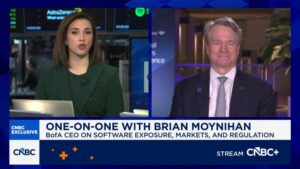Lloyds (LSE: LLOY) shares have performed very strongly recently. In fact, they’ve now doubled in four years, and are up 32% in the past year alone. That’s without adding in the dividends.
Looking ahead, there are some attractive dividend yields forecast for the next couple of years. So, should I add this FTSE 100 bank stock to my portfolio? Let’s discuss.
Passive income potential
As things stand, City analysts expect Lloyds to pay out total dividends of 3.40p in 2025 and 3.87p in 2026. Based on the current share price of 56p, the respective forward yields are 6.1% and 6.9%.
That looks attractive to me, especially as the dividend cover is strong. For 2025, the prospective payout is covered twice over by forecast earnings. While no dividend is guaranteed, this level of coverage means the income prospects appear solid.
A 6%+ yield is comfortably above the FTSE 100 average of 3.5%. It’s also higher than the forward yields of Barclays (3.7%) and NatWest (5%). Both of those stocks have doubled over the past year or so!
However, the Lloyds forward yield lags that of HSBC, which is offering 6.7%. The Asia-focused bank is also a much better candidate than Lloyds to dish out special dividends, as it continues to sell off various Western businesses.
All in all though, there’s some decent passive income potential here from Lloyds.
Two issues
However, there are two key concerns here. First, as interest rates drop, the lender’s net interest income (NII) is likely to shrink. This income, generated from the difference between the interest earned on loans and paid on deposits, has already been declining for Lloyds in recent months.
Second, the motor loan mis-selling issue is becoming something much bigger than originally feared. Last week, the Court of Appeal declared it unlawful for lenders to pay commissions to car dealers without the borrower’s consent. The hidden commission means consumers have been paying more for car finance.
Lloyds is the biggest motor finance provider among the UK’s high street banks, with its Black Horse division overseeing around £15bn in loans. So it’s at the centre of all this.
This could have wider consequences
How much could this cost Lloyds? I’ve seen figures as high as £3.9bn, in a worst-case scenario. Others put it a bit lower. Lloyds has set aside £450m, just in case.
However, from what I understand, this ruling could have wider implications. That’s because it seems all relevant commissions need declaring, meaning this might spill over into other financial products beyond car finance.
Of course, we don’t know how this will play out. The Supreme Court might yet overturn the court ruling, while scary headline figures — £3.9bn, for example — can often end up wide of the mark.
Sill, there’s now a dark cloud of uncertainty hanging over the stock, and I doubt it’ll lift any time soon. If the dividend rises in 2025, will it be accompanied by a falling share price? This worries me as a potential investor.
I’m going to avoid Lloyds shares for now and see how things develop. If the mis-selling crisis mushrooms into something far larger, then there could be buying opportunities in bank stocks on the horizon.
This post was originally published on Motley Fool







